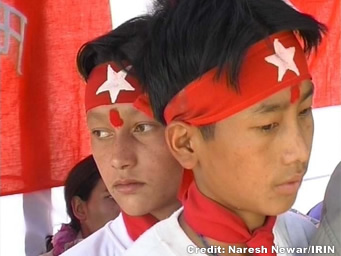 |
| Child Soldiers in Nepal |
|
|
|
|
|
|
|
|
|
|
| Reintegration of child soldiers "taking too long" |
KATHMANDU, 27 May 2008 (IRIN)
The UN Children's Agency (UNICEF) and local children's rights groups are concerned about the slow reintegration of child soldiers associated with former Maoist rebels, also known as the Communist Party of Nepal-Maoist (CPNM).
Nepal's decade-long armed conflict ended in November 2006 but thousands of minors associated with the People's Liberation Army (PLA) of the CPNM have yet to be formally discharged and reintegrated, the agencies told IRIN on 26 May.
 |
|
The initial plans for reintegrating the children have already been shared with the interim government, including the CPNM, for their feedback, UNICEF officials said
Consensus delayed
NGOs are concerned that the discharge and reintegration of child soldiers is being delayed due to the absence of a new government, despite the successful Constituent Assembly elections in April. An interim government has been running the country since the peace deal was signed in 2006.
They say the obstacle is a lack of consensus mostly among the leading parties including CPNM, Nepali Congress (NC), CPN-Unified Marxist Leninist (UML) and Madhesi Janadhikar Forum (MJF).
However, the Ministry of Peace and Reconstruction (MOPR) said that preparations were under way to develop an action plan and set up a tripartite committee comprising the interim government, CPNM and UN to tackle issues related to the discharge of child combatants.
The Maoist leadership has told IRIN their party stands committed and blamed the government for delays in the reintegration process.
"We have a committee led by MOPR but it has shown little interest in focusing on this issue," senior Maoist leader and parliamentarian Khim Lal Devkota told IRIN.
Devkota added that the government had failed to call even a single meeting over the past year on the subject. "We are ready to help in the reintegration [of child soldiers] process," he said, adding that there was a need for a proper reintegration package.
UN and NGOs on standby
"We are already on standby to help as many child soldiers as we can but the children have to be discharged first," said Tarak Dhital from Child Workers in Nepal (CWIN), a national NGO.
UNICEF said aid agencies were all prepared to give full financial support for effective implementation of the national plan of action for reintegration.
"There is a strong network of national and international NGOs and civil society-based groups, as well as community-based organisations, ready to support the reintegration of children discharged from cantonments," said UNICEF's Mellsop.
UNICEF and NGOs are providing community-based reintegration support to 5,000 children and youth in 58 districts affected by the armed conflict. These include children who have been associated with armed groups and those who have informally left the cantonments.
However, UNICEF is concerned that the longer the children and youth remain in the cantonments, and hence away from their families and communities, the more difficult the reintegration process is likely to be once they are released.
The re-integration programme is supported by the governments of Japan, Germany, Denmark, Belgium, Norway, Austria and UK.
| Credit
IRIN 2008 Copyright © UN Office for the Coordination of Humanitarian Affairs 2008 [ This report does not necessarily reflect the views of the United Nations] Integrated Regional Information Networks (IRIN), part of the UN Office for the Coordination of Humanitarian Affairs (OCHA) |
| IRIN
News |
IRIN News |
|
|
 |
|
|
|
|

